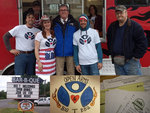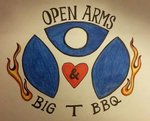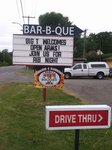





In the last few weeks, I’ve had the fortune of running into both Chandra Shilley, coordinator behind the citizen-powered group Open Arms, the Facebook-organized group that provides food and provisions to homeless individuals and others in need, and Tom Atkins, BBQ savant and owner of Big T BBQ in Centralia.
You might have seen a segment on Open Arms, featuring Shilley and Atkins, on KOMO News a little over a month ago. The segment detailed the group’s latest brush with codes and regulations.
About 6 weeks ago, Shilley was notified that a complaint had been filed (complainant undisclosed) against the group over concerns with how the donated and privately purchased food was prepared for consumption by patrons of the weekly event at the Centralia Train Depot. According to local health department officials, Shilley’s in-home preparation and kitchen space did not meet commercial or retail health code standards.
Open Arms responded by reaching out to their citizen community on Facebook for a solution. That’s where Tom Atkins of Big T BBQ came into the story.
Atkins, a restaurant owner and caterer, is very familiar with health code regulations. He contacted Shilley and made arrangements to donate the use of one of Big T BBQ’s commercial kitchen trailers. This was a move that both Shilley and Atkins believed would satisfy the basis of the original complaint.
Food preparation routines were also updated to address other potential concerns — including food holding temperatures, etc. — and the show went on. As you probably saw in the KOMO segment, it appeared that Open Arms was free and clear of public officials’ concerns yet again.
But subsequently, additional issues have now popped up. Despite the very obvious and visible efforts of the group, local and state officials have notified Shilley of additional issues.
Because the citizen collective, Open Arms, is not a formal nonprofit and only really exists on social media, they were informed that they are required to purchase a roughy $600 permit to continue their free weekly offering of food items and meals prepared with donated products.
Again, demonstrating their resilience, the group rallied on Facebook, along with Big T BBQ, and planned a Friday Night BBQ event two weeks ago, with proceeds from the evening going towards the permit fees. Big T BBQ took pre-orders for ribs and other smoked delights, and Shilley organized items for benefit auction baskets, among other things.
The money was raised handily by supporters of the group.
Despite that support, Shilley says that, ultimately, Lewis County and state health officials could still deny the permit, effectively shuttering the weekly event at the local rail depot.
“Now the health department is saying we can’t accept any donations to serve,” said Schilley. “Even if it’s from a business.”
Shilley provided an example: “Like, the eggs donated from Briarwood today … nope … can’t serve them with this $600 permit. Can’t accept any food donations.”
Even though the weekly event is obviously a non-commercial venture, without a formal nonprofit designation, the group is required to adhere to the Washington state retail food code.
I asked Shilley if she had considered becoming a formal non-profit. After all, her loosely affiliated band of citizen supporters had already demonstrated more consistency, determination, direct impact and effectiveness collectively in the last two years than even some long-standing local formal nonprofit organizations.
Shilley’s response really summed up her views on the topic, in a perfectly succinct and very “Shilley” style nutshell.
“I just wanna feed people and not have to answer to an accountant for all the tampons and bologna I pass out,” she said.
Because, at the end of the day, that’s all Shilley’s mission every was: To make sure that people weren’t going without, if she could help it. Whether that was a meal, or personal hygiene items, or outdoor survival gear, or simply a warm hug and a smile.
And yet, local and state health department officials are also fulfilling their mission: To make sure that food served to the public — whether a restaurant goer or a citizen benefitting from a charitable program — is served according to safest, best practices.
Both equally noble and important missions, both sharing common ground and concerns, with an unclear, incomplete solution.
While Open Arms often takes an unconventional approach, the group tends to err on the side of practicality. After facing friction with the City of Centralia for affixing cold weather clothing items directly to trees and city street fixtures, amends were made and city councilors and officials worked directly with citizens of the group to find a workable solution.
I am hopeful that county and state officials will continue this spirit of private-public cooperation so that these citizens will continue to be empowered to directly respond to needs within our communities.
•••
Brittany Voie is a columnist for The Chronicle.